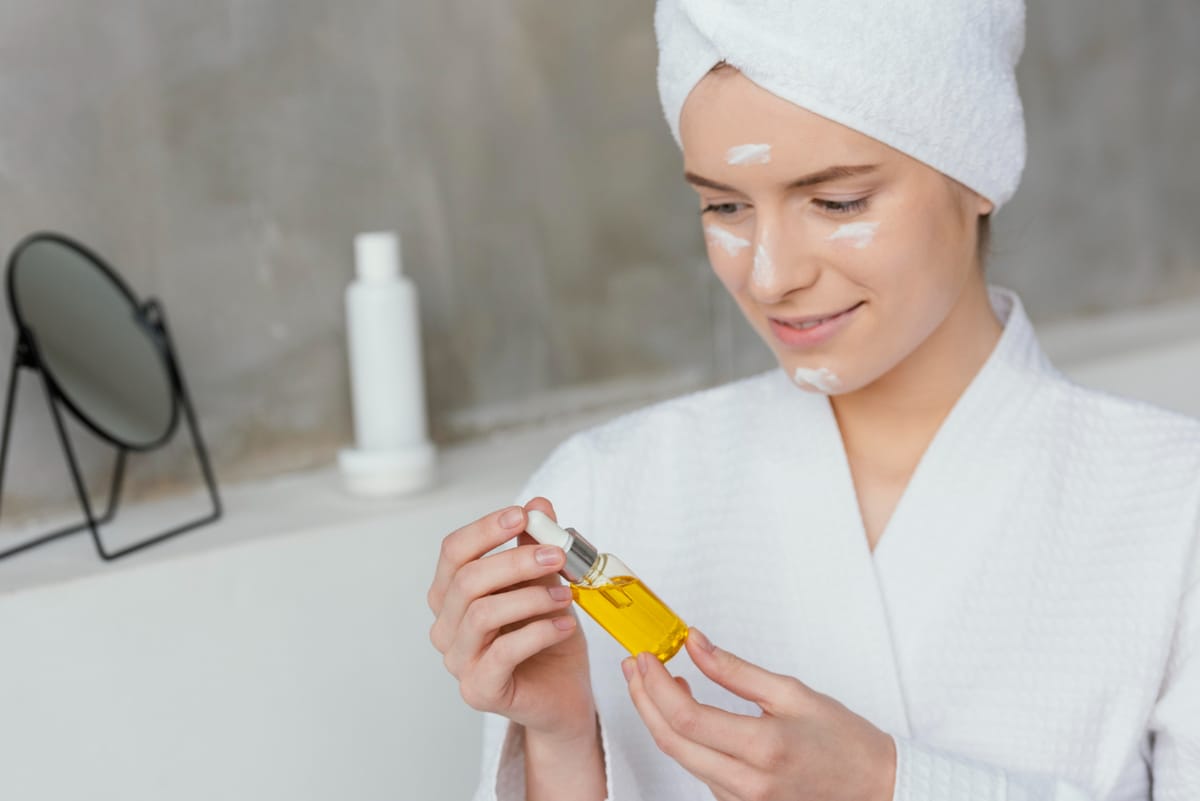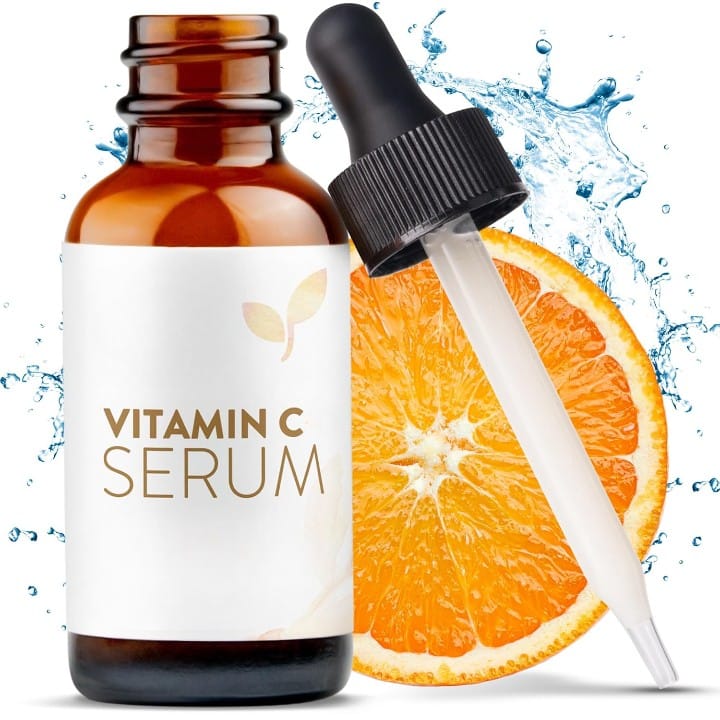Key Takeaways:
- Vitamin C serum can significantly improve skin texture and tone, leading to a brighter, more even complexion.
- Consistent use of vitamin C serums, especially those with additional antioxidants like vitamin E and ferulic acid, can protect skin from environmental stressors and promote collagen production.
- Choosing the right vitamin C serum for your skin type and using it correctly is crucial for achieving the best results and avoiding skin irritation.
Vitamin C serums have become a staple in the skincare world, lauded for their ability to brighten the complexion, even out skin tone, and boost overall skin health. But what can you expect from incorporating a vitamin C serum into your skincare routine? Let's dive into the transformative journey of using vitamin C serum, from the initial application to the visible results after consistent use.
The Initial Encounter: Applying Vitamin C Serum
When you first apply vitamin C serum to your skin, you might notice an immediate difference in how your skin feels. The potent antioxidant properties of the serum can give your skin a brighter and more hydrated appearance. For those with sensitive skin, it's essential to perform a patch test to ensure that the skin responds well to the active form of vitamin C, known as L-ascorbic acid.
The Antioxidant Powerhouse: Neutralize Free Radicals
Vitamin C is a potent antioxidant that effectively counteracts free radicals resulting from exposure to ultraviolet light and environmental stressors. This means that from the first application, you're already helping to protect your skin from future damage. Over time, this can lead to a reduction in visible signs of aging, such as fine lines and wrinkles.
Consistency is Key: Regular Use of Vitamin C Serum
For those wondering about the vitamin C serum before and after effects, it's important to understand that consistency is crucial. Regular application of the serum, typically once or twice a day, is necessary to maintain antioxidant protection and to continue to promote collagen production, which is vital for youthful-looking skin.
The Transformation: Skin Texture and Tone
After several weeks of consistent use, many users report a noticeable improvement in their skin texture and tone. The serum works to brighten the complexion and reduce the appearance of stubborn dark spots, leading to a more even skin tone. This is where the before and after effects become truly apparent.
The Added Boost: Vitamin C with Vitamin E and Ferulic Acid
Many of the best vitamin C serums also contain vitamin E and ferulic acid, which can enhance the efficacy of vitamin C. This combination not only evens skin tone but also adds extra hydration and improves the skin's ability to repair itself.
The Right Serum for Your Skin Type

It's essential to choose a vitamin C serum that's suitable for your skin type, whether you have dry skin, oily skin, or acne-prone skin. The right formula will ensure optimal results without causing skin irritation or exacerbating existing skin issues.
L-Ascorbic Acid: The Purest Form of Vitamin C
When it comes to topical vitamin C, L-ascorbic acid stands out as the purest form, renowned for its skin-brightening and collagen-boosting properties. This water-soluble powerhouse is a favorite among skincare enthusiasts for its ability to even out an uneven skin tone and promote a more radiant complexion. However, its potency also means it requires careful formulation to maintain stability and effectiveness, making it a prime ingredient in the best vitamin C serums on the market.
Despite its benefits, L-ascorbic acid can be quite potent, which is why those with acne-prone skin must approach it with caution. When incorporated into a skin routine, it should be used in concentrations that are effective yet gentle to avoid irritation. For many, the quest for youthful-looking skin leads them to this ingredient, and when used correctly, it can significantly diminish the appearance of acne scars and promote a bright, even complexion.
The Synergy with Sunscreen: Amplifying Protection
When it comes to safeguarding your skin cells from the sun's harmful rays, the combination of vitamin C serum and sunscreen is like a dynamic duo. L ascorbic acid, the pure vitamin C form found in the best vitamin C serum options, not only promotes collagen production but also enhances the efficacy of your sunscreen. By applying a bright serum packed with vitamin C before your sunscreen, you're giving your skin an extra layer of defense against UV-induced damage, which can lead to premature aging and a less youthful-looking complexion.
Moreover, a board-certified dermatologist would likely recommend this powerful pairing as part of a comprehensive skincare routine, especially for those with acne-prone skin. The antioxidant properties of vitamin C serums help to neutralize free radicals and brighten the complexion, while sunscreen acts as a physical barrier, protecting the skin from further damage. Together, they work to maintain the integrity of your skin cells, ensuring that your skin remains resilient and vibrant under the sun's relentless gaze.
The Battle Against Blemishes: Vitamin C for Acne Prone Skin
When it comes to acne-prone skin, the battle for a clear complexion can feel never-ending. But there's a hero in the skincare saga: Vitamin C serum. This water-soluble elixir is known for its ability to brighten complexion and offer antioxidant protection, but its benefits for blemish-prone skin are particularly noteworthy. By reducing inflammation and promoting wound healing, Vitamin C can help to mitigate the aftermath of acne, such as redness and hyperpigmentation, making it a valuable ally in your skincare arsenal.
Moreover, incorporating a Vitamin C serum into your daily routine can prevent the formation of new blemishes. Its ability to enhance skin barrier function means less opportunity for acne-causing bacteria to wreak havoc. For those with oily or acne-prone skin, consulting with a board-certified dermatologist can provide personalized advice on the concentration and formulation of Vitamin C serum that will best suit your skin's needs, ensuring you reap the maximum benefits without exacerbating any existing conditions.
The Luminous Lift: How Vitamin C Can Brighten Complexion
A radiant, even-toned complexion is often seen as a hallmark of healthy skin, and Vitamin C serum is a potent tool in achieving that coveted glow. Its ability to brighten complexion stems from its role in inhibiting melanin production, which can help to fade dark spots and lead to a more uniform skin tone over time. This water-soluble vitamin is a gentle yet effective option for those looking to enhance their skin's natural luminosity without resorting to harsh chemical treatments or invasive procedures.
In addition to its skin-brightening properties, Vitamin C's antioxidant activity protects against UV-induced damage by neutralizing free radicals. This not only contributes to a brighter complexion but also supports overall skin health. For tailored advice on how to integrate Vitamin C into your skincare routine for maximum glow, a consultation with a board-certified dermatologist can be invaluable. They can recommend the right type and concentration of serum to illuminate your skin while addressing any specific concerns you may have.
Citrus Fruits: A Natural Bounty for Skin Health
Citrus fruits are nature's treasure trove of vitamin C, and incorporating them into your diet can complement the topical application of a vitamin C product. These fruits not only brighten the complexion from within but also provide a water-soluble form of vitamin C that's readily absorbed by the body. Eating a diet rich in citrus fruits can help fortify your skin cells from the inside out, promoting a more youthful-looking skin that radiates health.
But the benefits don't stop at ingestion. Some of the best vitamin C serums harness the power of these fruits in their formulations, ensuring that your skin receives a pure vitamin boost directly where it's needed. By using a bright serum derived from citrus fruits, you're applying nature's recipe for enhancing skin texture and tone. This holistic approach to skincare, combining both dietary and topical sources of vitamin C, can lead to impressive results, leaving your skin looking as if it's been kissed by the sun itself.
Combining Forces: Vitamin C and Retinol
Pairing a brightening serum rich in vitamin C derivatives with a retinol product can be a game-changer for your skin routine. This dynamic duo works to amplify the benefits of each other, with vitamin C protecting against free radical damage during the day and retinol working its rejuvenating magic at night. Together, they accelerate skin cell renewal and promote collagen production, leading to a more youthful-looking skin that's both bright and firm.
However, it's important to note that while the combination can be potent, it should be introduced gradually and with guidance from a board-certified dermatologist. Tetrahexyldecyl ascorbate, a fat-soluble form of vitamin C, is often recommended for use with retinol as it's more stable and less irritating. When used in tandem, these ingredients can significantly improve the texture and tone of the skin, making them a staple in many effective skincare products.
The Long-Term Benefits: After Months of Use
With long-term use, the benefits of vitamin C serum become even more pronounced. The skin appears more radiant, and the serum's ability to promote collagen production can lead to firmer, more resilient skin. Additionally, the serum can help to prevent the formation of new dark spots and fine lines.
The Role of Hyaluronic Acid and Other Skincare Ingredients
Some vitamin C serums are formulated with hyaluronic acid, which can improve hydration and plump the skin, further enhancing the serum's skin-brightening effects. When combined with other skincare ingredients like retinol or eye cream, vitamin C serum can be a part of a comprehensive skincare routine that addresses multiple skin concerns.
The Importance of Proper Storage
Proper storage is crucial for maintaining the effectiveness of your vitamin C serum. Ensure its potency by storing it correctly. Vitamin C can be unstable when exposed to light and air, so it's best to store vitamin C products in a cool, dark place to maintain their potency.
The Final Verdict: Before and After
Ultimately, the before and after effects of using vitamin C serum can be quite dramatic. With consistent use, the serum can significantly improve the appearance of the skin, leaving it looking brighter, more even, and more youthful.
The Expert Opinion: Advice from a Board-Certified Dermatologist
For those seeking professional advice, a board-certified dermatologist can guide how to use vitamin C serum for maximum benefits. They can also recommend products with the right concentration of active ingredients for your specific skin concerns.
The Conclusion: Vitamin C Serum's Place in Your Skincare Routine
Incorporating vitamin C serum into your skincare routine can lead to visible progress in skin health and appearance. By understanding how to use the serum effectively and choosing the right product for your skin type, you can unlock the full potential of this skincare superstar.

How often should I use vitamin C serum?
For optimal results, it's generally recommended to apply vitamin C serum once or twice daily. However, always follow the instructions provided by the serum's manufacturer and consider your skin's sensitivity.
Can vitamin C serum cause skin irritation?
While vitamin C serum is generally safe for most skin types, it can irritate some individuals, especially those with sensitive skin. It's important to perform a patch test before full application and to start with a lower concentration if you're new to using vitamin C products.
Should I apply vitamin C serum before or after my moisturizer?
Vitamin C serum should be applied to clean, dry skin after cleansing and toning but before applying moisturizer. This allows for better skin penetration and ensures that the serum's active ingredients are effectively absorbed.
Can I leave the serum overnight?
Yes, you can leave the serum on your skin overnight. Many serums are designed to be left on overnight, particularly those containing active ingredients that work best during the skin's regeneration process while you sleep. However, it's crucial to ensure that the serum does not contain ingredients that might irritate your skin if left on for extended periods. Leaving the serum overnight can help your skin absorb the active ingredients and maximize its efficacy.
How many drops of vitamin C serum?
The amount of vitamin C serum you should use can vary depending on the product and your skin type. However, a general rule of thumb is to use about two to three drops for your entire face. It's always best to start with a smaller amount and gradually increase if needed, as using too much serum can lead to skin irritation.
Can I apply vitamin C at night?
You can apply vitamin C serum at night. Applying it at night may be beneficial as it can work with the skin's natural repairing process that occurs when you sleep. However, it's important to note that vitamin C serum can be used both in the morning and at night.
Why is vitamin C making me darker?
Vitamin C itself should not darken your skin as it is known to inhibit melanin production which can help to prevent dark spots and hyperpigmentation. However, if you notice your skin getting darker after using a vitamin C serum, it could be due to irritation or an allergic reaction, in which case you should discontinue use and consult a dermatologist.
When not to use vitamin C?
You should avoid using Vitamin C serums if you have sensitive skin or allergic reactions to acidic products. Also, if you are using other strong ingredients like retinol or chemical peels, it's best to use them at different times as they can irritate the skin when used together.
What is a good skincare routine?
A good skincare routine generally includes cleansing, toning, applying a serum, and moisturizing. You may also want to include an exfoliant once or twice a week, and sunscreen should be worn every day to protect against sun damage. The exact products and routine may vary depending on your skin type and specific concerns.
How do I choose a vitamin C serum?
When choosing a vitamin C serum, look for one that contains pure L-ascorbic acid, which is the most effective form of vitamin C. Additionally, check the concentration - a higher concentration (15%-20%) is more effective but may also be more likely to irritate. Also, consider the pH level, packaging (dark bottles help prevent oxidation), and additional ingredients like ferulic acid or vitamin E that can boost the effectiveness of vitamin C.
What are the disadvantages of vitamin C serum for the skin?
While vitamin C serums offer numerous benefits, they can also have some potential disadvantages. These include causing irritation or redness, especially in people with sensitive skin, and they can cause a stinging sensation upon application. Vitamin C serums can also oxidize quickly, which can make them ineffective.
Why Garnier Vitamin C serum is best?
Garnier Vitamin C serum is often praised for its fast-absorbing formula that delivers visible results quickly. It contains 30% vitamin C, which is a high concentration that can effectively brighten the skin and reduce the appearance of dark spots. However, what makes a serum "the best" can vary greatly from person to person depending on their skin type and needs.
Why am I getting pimples after using vitamin C serum?
Getting pimples after using a vitamin C serum could be due to a few reasons. It might be that your skin is purging, which is a process where the serum accelerates the rate at which your skin exfoliates and causes pimples to surface. It could also be that you're allergic to one of the ingredients in the serum, or the serum could be too heavy for your skin type, leading to clogged pores.

Vitamin C serum is a transformative skincare product that can lead to significant improvements in skin texture, tone, and overall health. Its antioxidant properties help to neutralize free radicals and protect the skin from environmental damage. Consistent use is key to achieving the best results, and combining vitamin C with other antioxidants like vitamin E and ferulic acid can enhance its benefits. Choosing the right serum for your skin type and using it correctly are essential steps to avoid irritation and achieve a brighter, more even complexion. With long-term use, vitamin C serum can help maintain youthful-looking skin and prevent the signs of aging.













